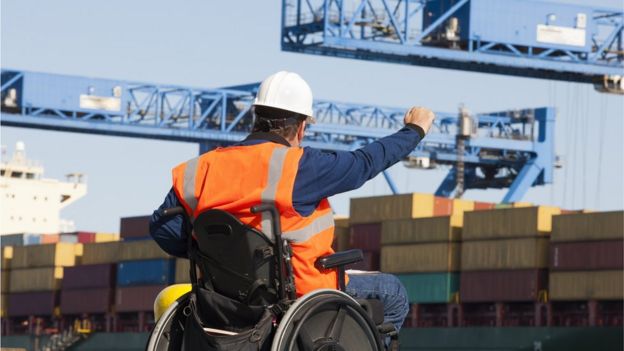Across the world up to 1.2 billion people live with some sort of disability, it is estimated. That’s equivalent to the population of China.
In the UK, it is thought that some seven million people of working age have a disability, which all adds up to an awful lot of spending power.
Latest figures from the UK’s Department of Work and Pensions estimate that this spending power, the so-called “purple pound”, is worth £249bn to the economy.
So what should businesses be doing to try to get a share of this money?
That’s what we’ll be asking during Disability Works week from the BBC’s business and economics unit.
We’ll be looking at how businesses work with people with disabilities and how disabled people have made business work for them.
Challenging stereotypes
I gradually began to lose my eyesight when I was in my teens so I understand the difficulties for disabled people getting into work. I’ve been a producer in the BBC’s business and economics unit for nearly nine years.
I’m keen to address the stereotype of disabled people that we all too often see in the media. For every one of the superheroes climbing mountains or the wheelchair marathon runners, there are dozens of people quietly getting on with running their own business.
There are also likely to be a lot of disabled people watching the news who miss out on seeing people like themselves reflected in bulletins. I’m hoping that this week will go some way to addressing that.
We’ll be talking to disabled men and woman who have decided to start their own businesses, from the Welsh baker just at the start of his journey into entrepreneurship, right the way through to the Christmas tree farmer who’s been selling trees for over 20 years.
Business sense, not charity
Many big businesses realise that by simply listening to and understanding the needs of their disabled customers, a rich new revenue stream can be opened up.
It is not about charity, though. It makes hard business sense to address the needs of this demographic.
Diversity in a workforce has long been said to be beneficial to a company. The need to reflect your customer base within the workforce brings empathy and understanding, and far from being a hindrance to a business, this diversity can bring a strength.
We’ll look at the UK fragrance house that has teamed up with a college for the blind in Mumbai in India in order to train people to become perfumers and the South African business that is training disabled welders.
The whole idea is to show that with a little bit of adaptation and understanding, disabled people can and do add to the economy.
Disability Works
 Image copyrightTHINKSTOCK
Image copyrightTHINKSTOCK- The BBC’s business and economics unit is looking at how businesses work with people with disabilities and how disabled people have made business work for them
- A range of stories will feature across online, TV and radio from 20-24 February 2017
- On Twitter and Facebook you can follow the hashtag #DisabilityWorks and at the end of the week you can download the Ouch podcast






